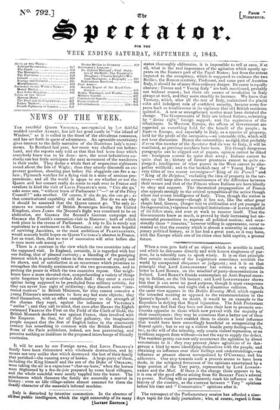Italy is disturbed by intestine commotion. In the absence of
all free public intelligence, which the rigid censorship of its many states thoroughly obliterates, it is impossible to tell at once, if at all, what is the real importance of the agitation which openly ap- pears on the Eastern part of the Papal States ; but from the extent imputed to the conspiracy, which is supposed to embrace the two Sicilies, the Roman territory, Piedmont, and some part of Austrian Italy, it should be of more than ordinary danger. Its cause is equally obscure : France and" Young Italy" are both mentioned, probably not without reason ; but there are causes of revolution in Italy always at work, and they seem steadily to increase. We know that Tuscany, which, after all the rest of Italy, maintained the placid calm and indulgent rule of confident security, became some few years back so troublesome in its vigilance that old British residents quitted it. A new or strengthened motive must have dictated the change. The Governments of Italy are indeed fictions, subsisting by " divine right," foreign support, and the supineness of the inhabitants. Iii Western Europe, the offices of Government are regarded as something held for the benefit of the people ; in Eastern Europe, and especially in Italy, as a species of property, held for the profit of the occupants,—an untenable title, which will not bear discussion. Hence the censorship ; so rigid, that probably if even this number of the Spectator find its way to Italy, it will be mutilated, as previous numbers have been. But though dangerous paragraphs can be clipped out of papers, opinion cannot be diked out : foreigners cannot be quite shut away ; Italians cannot be quite shut in ; history of former greatness cannot be quite ex- punged; intelligence of what passes in the West cannot be alto- gether withheld ; and to the bookish race of " Young Italy" the very titles of two recent sovereigns—" King of the French" and "King of the Belgians," excluding the idea of property in the ter- ritory—will keep alive the consciousness of the difference between their tenure and that of the Princes whom Italians are born blindly to obey and support. The theoretical propagandism of France also appeals strongly to the critical sympathies of the active though silent and covert intelligence of Italy. Thus, though the nation is split up like Germany—though it has not, like the other great classic land, Greece, (longer lost to civilization and yet younger in its regeneration,) vigorous municipal institutions—it is ever mindful of its fallen state, and ever at work to recover itself. That the Governments know as much, is proved by their increasing but un- successful precautions to supress all political motion; and occa- sionally these " emeutes," however trifling in appearance, occur to remind us that the country which is almost a nonentity in contem- porary political history, as it has had a great past, so it may have, with the Europe which one of its cities once held captive, a greater future.


























